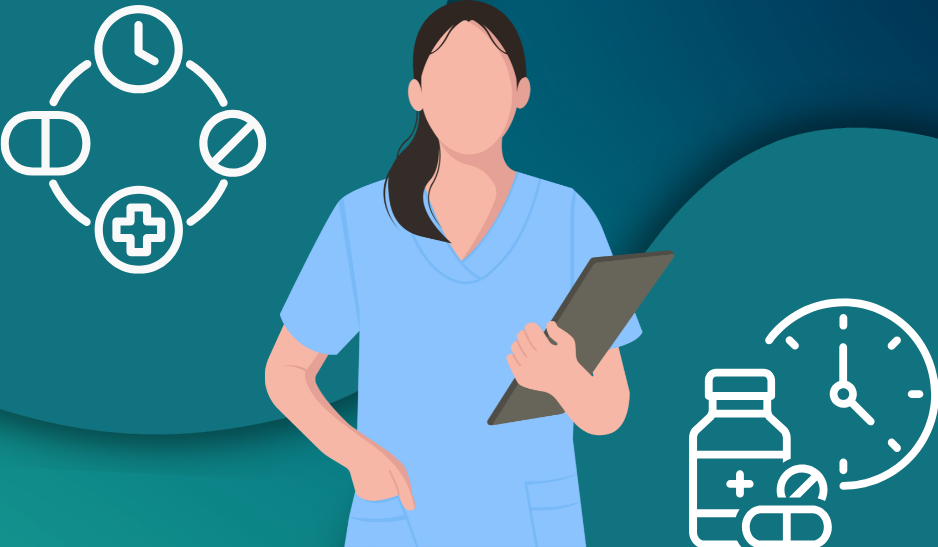Healthcare compliance training touches every part of post-acute care organizations. As regulations tighten and patient privacy standards […]
Did you know that more than half of older adults take four or more prescriptions a day?
It can become even more difficult to manage as the complexity of their care grows. This is where the support of caregivers comes into place.
Medications are one of the most essential parts of managing the health of clients and residents. If care teams work together and understand proper medication administration procedures they can protect client and resident safety and enable their well-being.
Ensure caregivers understand the core medication rights.
Any wrongdoing in medication administration is associated with the supervising nurse’s license, regardless of whether they are present and in the room with a client or resident.
Proper caregiver training for medications not only empowers caregivers with the confidence they need to perform their role, it also ensures safety and compliance with care plans and doctor’s orders. There are seven rights of medication administration to follow.
What are the seven rights of medication administration?
- Right Person: Caregivers should double-check that they are looking at the right medications for each resident and only focus on one resident’s needs at a time to avoid mistakes.
- Right Medication: Caregivers should carefully review their client or resident’s medication orders during their shift to ensure that they’re looking at the right prescription.
- Right Dose: Sometimes residents take the same medication in different dosages at different times of the day or different days of the week.
- Right Time: Ensure medications are administered at the correct time. Many medications are time sensitive — sometimes down to the hour.
- Right Route: There are many different types of medications, from breathing treatments to topical ointments, to oral pills. Caregivers need to be well-trained on the different types of medications they will encounter and how they are administered. This includes understanding what side effects to watch for.
- Right Reason: Caregivers need to read medication labels in detail and confirm that they have the right diagnosis that coincides with each medication. Train caregivers to observe and report any discrepancies or errors.
- Right Documentation: “If it’s not documented, it’s not done.” Make sure caregivers understand the importance of documenting care tasks and notes throughout their shifts in real-time (or as close as they can get). This is important for client and resident safety, preserving the community or agencies reputation, and to be able to trace back any abnormalities or illnesses that a client or resident may be experiencing.
When caregivers fully understand what they’re doing and why, they will feel more confident in their skills and deliver higher quality care.
Make medication times more personal — and engaging.
Having to take multiple medications a day can be stressful for clients or residents. Educate caregivers on the importance of making these tasks feel frictionless and as engaging as possible.
Medications are an important part of any care plan. Nurses and administrators alike should take the time to inventory client or resident preferences on a continuous basis as new medications are added and adverse effects may arise.
Some clients or residents, for example, might prefer to take medications with applesauce. Others might enjoy a large glass of water and a protein bar.
This also means helping and empowering clients and residents to do what they can for themselves. If someone is able to take a pill on their own and demonstrate that it’s taken, they should be allowed to do so. This preserves their sense of dignity, respect, and independence.
Approach challenging medication situations with ethical and sound decision-making skills.
Your caregivers may encounter clients or residents enduring personal challenges, health challenges, or other factors that could make medication management more difficult. Encourage them to approach situations and challenges with an open mind and heart.
For example, if a client or resident expresses concerns about taking medication, even if it’s something they take every day, educate caregivers on the importance of respecting those concerns. They can easily share the name of the medication and what it’s used for in a calm and gentle voice. This eases the mind while validating concerns.
READ MORE: Essential Skills for Assisted Living Caregivers: Using Communication to Improve Quality of Life
Caregiving can be stressful at times. Agencies and communities can support caregivers on how to react during moments of stress helps demonstrate compassion and empathy in the workplace.
By leading from the top and sharing how to handle conflict, whether that’s with a family member, resident, client, or colleague, can help caregivers come up with their own unique approaches to complex care situations.
Enable caregivers to do their best work while ensuring client and resident safety and compliance.
Clients and residents rely on care teams for consistent, quality care. Equipping caregivers with the right tools, resources, and training can empower them to look out for adverse signs, enable changes to care plans, and document tasks that support a client or resident’s quality of life.
You can start your free trial of CareAcademy today and ensure caregivers have initial and ongoing training to be equipped to handle medication management and provide better health outcomes for your clients and residents!




